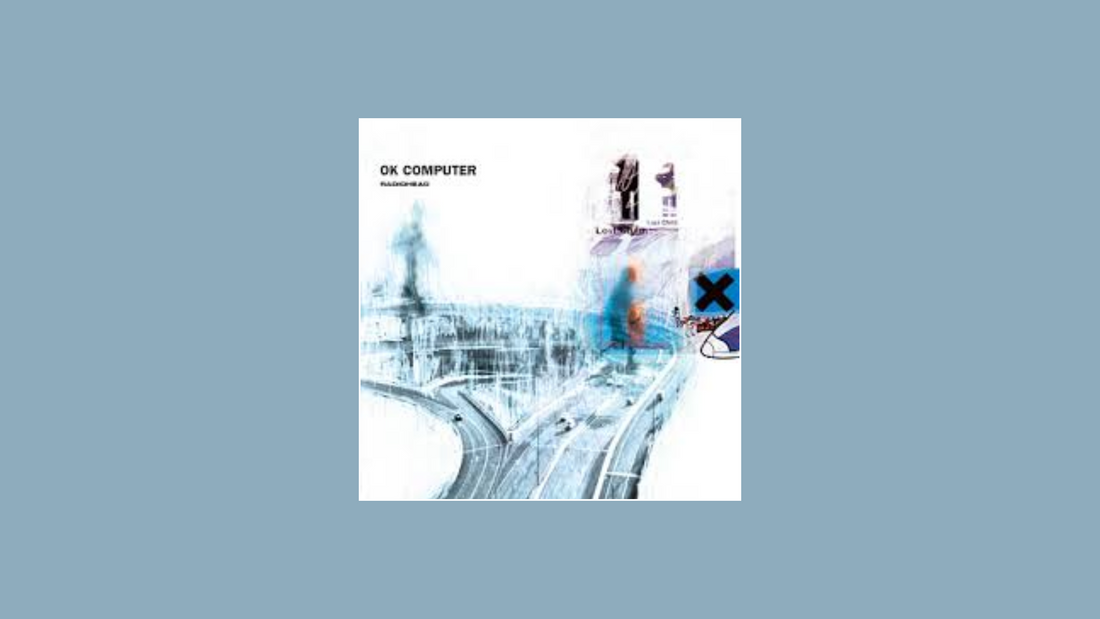
Radiohead – OK Computer (1997)
By Rafi Mercer
There are albums that arrive like warnings, coded in sound. Radiohead’s OK Computer, released in 1997, is one of those records. Even now, more than twenty-five years on, its textures and atmospheres feel prescient — a map of anxieties that have only deepened. Yet for all its themes of alienation and technological unease, it remains one of the most sonically rewarding albums of its era, a record that rewards not only study but deep listening.
Radiohead had already broken through with The Bends, a guitar record that proved their ambition went beyond grunge-era angst. But OK Computer was something else entirely. It stretched rock into a widescreen soundscape that fused atmosphere, melody, and texture in unprecedented ways. Produced with Nigel Godrich, the band built layers of sound that were not clutter but architecture — guitars treated as colour, rhythms sculpted into texture, vocals floating as much as declaring. This was not rock as riff, but rock as environment.
The opening track, “Airbag,” begins with Jonny Greenwood’s guitar sampled, looped, and twisted into something almost electronic. Phil Selway’s drums arrive with depth and punch, Colin Greenwood’s bass grounds the rhythm, while Thom Yorke sings with a detached clarity that cuts through the haze. Already, the album announces its intent: this is not about spectacle, it is about immersion.
Then comes “Paranoid Android,” a suite disguised as a single, moving through moods of menace, beauty, anger, and resignation. Its structure is less song than journey, guitars crashing into choral harmonies, whispers dissolving into howls. On vinyl, the shifts in texture are astonishing: the crystalline highs of Yorke’s falsetto, the thunderous weight of guitars, the delicate interludes where silence holds as much as sound.
“Subterranean Homesick Alien” is a hymn to estrangement, built on swirling guitars and Rhodes piano, a groove that drifts rather than drives. “Exit Music (For a Film),” written for Baz Luhrmann’s Romeo + Juliet, is hushed devastation, Yorke’s voice beginning as confession before erupting into distortion. “Let Down” layers chiming guitars until they form a latticework of melancholy, one of the band’s most exquisite productions.
At the heart of the record is “Karma Police,” both anthem and dirge, its piano-led arrangement building to a climax of distortion before dissolving into eerie calm. And then there is “No Surprises,” lullaby and nightmare at once, its glockenspiel and soft vocals disguising one of the bleakest lyrics in popular music. Few records manage this balance of beauty and dread.
Sonically, OK Computer is a triumph of production. The band and Godrich made deliberate use of space, allowing instruments to occupy distinct dimensions. Guitars are not simply strummed or distorted; they are processed, layered, expanded. Vocals are treated with reverb and echo that place them at once close and distant. The drums are mixed with clarity, the bass both grounding and melodic. On a high-fidelity system, the album reveals details endlessly: a whispered backing vocal, a faint guitar phrase, the resonance of a room. In a listening bar, it may not always be the natural choice — its intensity can overwhelm casual atmosphere — but in the right moment, it transforms the room into theatre.
What makes OK Computer endure is not only its sound but its vision. The themes of alienation, surveillance, disconnection, and unease with technology feel more relevant now than they did in 1997. Yet the record is not simply prophetic; it is human. Yorke’s voice carries vulnerability, longing, and fragility that counterbalance the coldness of the themes. The sound may be expansive, but the emotion is intimate.
For home listening, the album is a revelation. Its density rewards repeated plays, each time revealing new details. Its flow is deliberate, each track leading into the next, creating an arc that is both narrative and atmospheric. It is not background. It is foreground. It demands attention, but it rewards it richly. Sometimes, the Tracks & Tales library must look not only to bars and communal spaces but to the albums that transform the solitude of home listening. OK Computer is precisely that kind of record.
When the needle lifts, you are left altered. Not consoled, not soothed, but sharpened. You hear the world differently. And that, ultimately, is the mark of a deep listening record. It does not only fill a room; it reshapes it.
Rafi Mercer writes about the spaces where music matters. For more stories from Tracks & Tales, subscribe, or click here to read more.







